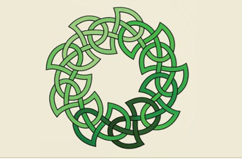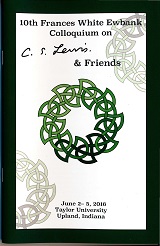Event Title
Paper Session 1-A: Books as Friends
Location
Euler 100
Start Date
2-6-2016 3:30 PM
Description
"Sufficiently Different to Help One Another: The Central Place of Books in the Friendships of the Inklings" - John Stanifer
Every year, the body of scholarship about the books produced by C.S. Lewis, J.R.R. Tolkien, and the rest of the Inklings continues to grow. Likewise, volumes have been written about the many close friendships maintained by these writers. But what of the books that helped to cement those friendships in the first place? What books played a part in the Inklings' friendships and why? As one examines the reading lists of the Inklings and their immediate circle of family and friends it becomes clear that similar tastes often led the Inklings to draw wildly different conclusions from the same books but that this had a tendency to help rather than harm their friendships. Whether in the pages of a book or Norse mythology clutched by two former strangers at a sickbed or in beer-fueled group readings of Beowulf, books frequently claimed a central place in the friendships of the Inklings by creating and sustaining the bonds that held these friends together.
"Nostalgia for English Literary Historians: C. S. Lewis's English Literature in the Sixteenth Century Excluding Drama" - Michael G. Smith
My paper explores the ways in which Lewis demonstrates how the literature of the past needs to be treated with respect - the kind we require of those in our time who critique other cultures. It also explores the ways Lewis helps his readers to employ discernment and discrimination (a good and necessary skill) as they lead toward making sound judgments and gaining access to the value and meaning of a particular literary work. It also explores the ways that Lewis's broad and deep learning -not only in literature--lead him to uncover much about both the works he examines and the times they inhabit. My paper is about what Lewis takes into the task of writing about English literature in the Sixteenth Century and what the reader gains form it. It is not, per se, a review or critique of his work in relations to other such works of literary history.
"Stories As Friends" - Andrea Marie Catroppa
Stories can have an indelible impact on individuals' lives, becoming lifelong friends. From an early age stories were some of C. S. Lewis's closest friends. He read voraciously as a result of being kept inside because of the inclement Irish weather and his parents' concern about illness. He also enjoyed writing and rereading the stories that he wrote about the imaginary world and characters of Boxen which he created with his brother. Throughout C. S. Lewis's life, certain books and writers became significant friends. This paper draws on C. S. Lewis's writing on friendship and stories and argues that having stories as friends powerfully influenced Lewis's life and can also enrich ours.
Event Type
Paper
Paper Session 1-A: Books as Friends
Euler 100
"Sufficiently Different to Help One Another: The Central Place of Books in the Friendships of the Inklings" - John Stanifer
Every year, the body of scholarship about the books produced by C.S. Lewis, J.R.R. Tolkien, and the rest of the Inklings continues to grow. Likewise, volumes have been written about the many close friendships maintained by these writers. But what of the books that helped to cement those friendships in the first place? What books played a part in the Inklings' friendships and why? As one examines the reading lists of the Inklings and their immediate circle of family and friends it becomes clear that similar tastes often led the Inklings to draw wildly different conclusions from the same books but that this had a tendency to help rather than harm their friendships. Whether in the pages of a book or Norse mythology clutched by two former strangers at a sickbed or in beer-fueled group readings of Beowulf, books frequently claimed a central place in the friendships of the Inklings by creating and sustaining the bonds that held these friends together.
"Nostalgia for English Literary Historians: C. S. Lewis's English Literature in the Sixteenth Century Excluding Drama" - Michael G. Smith
My paper explores the ways in which Lewis demonstrates how the literature of the past needs to be treated with respect - the kind we require of those in our time who critique other cultures. It also explores the ways Lewis helps his readers to employ discernment and discrimination (a good and necessary skill) as they lead toward making sound judgments and gaining access to the value and meaning of a particular literary work. It also explores the ways that Lewis's broad and deep learning -not only in literature--lead him to uncover much about both the works he examines and the times they inhabit. My paper is about what Lewis takes into the task of writing about English literature in the Sixteenth Century and what the reader gains form it. It is not, per se, a review or critique of his work in relations to other such works of literary history.
"Stories As Friends" - Andrea Marie Catroppa
Stories can have an indelible impact on individuals' lives, becoming lifelong friends. From an early age stories were some of C. S. Lewis's closest friends. He read voraciously as a result of being kept inside because of the inclement Irish weather and his parents' concern about illness. He also enjoyed writing and rereading the stories that he wrote about the imaginary world and characters of Boxen which he created with his brother. Throughout C. S. Lewis's life, certain books and writers became significant friends. This paper draws on C. S. Lewis's writing on friendship and stories and argues that having stories as friends powerfully influenced Lewis's life and can also enrich ours.


